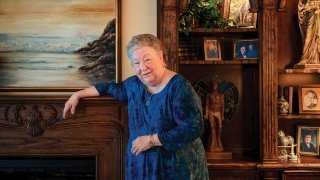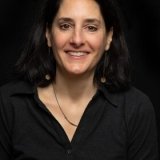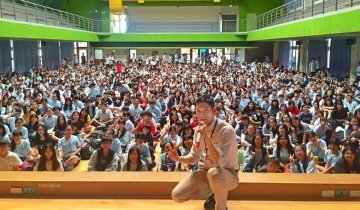Dr. Fahmy Attallah ME ’56 and Donna Ford met at the start of the 1962 school year, when he was the psychologist for the Cypress School District and she was a brand-new kindergarten teacher. “He was sitting behind me, trying to find out my name,” Donna recalled recently. “He said, ‘That’s the girl I’m going to marry.’”
Nine months later, when his prophecy became reality, the couple began the journey—and a 42-year-long marriage—that would leave its mark on USC: the Fahmy Attallah Chair in Humanistic Psychology at USC Rossier School of Education.
Their $2 million gift, in 1997, reflected the couple’s deep commitment to their professions: Fahmy, who earned a bachelor’s in psychology in 1955 and a master’s in education in 1956 at USC, worked for school districts in Los Angeles and Orange counties for two decades before devoting himself to private practice for an additional 10 years. He died in 2005 at 96. Donna taught kindergarten and first grade in the Cypress district for 40 years until her retirement in 2001.
The Attallah chair was first held by Donald E. Polkinghorne, a professor of counseling psychology who retained it until his 2005 retirement. It was not filled again until the appointment this year of USC Rossier Professor Mary Helen Immordino-Yang, a former middle school teacher who has gained international prominence through her work on the neural and psychological factors that support effective learning and teaching.
Immordino-Yang said she hopes the Attallah gift will enable her to more quickly advance the work of the USC Center for Affective Neuroscience, Development, Learning and Education, which she directs.
“Fahmy and Donna’s dedication to children and their communities, and their lifetimes of hard work on behalf of young people, are inspirational,” Immordino-Yang said. “Fahmy said it beautifully in a poem: ‘Deep down within us is a mine of potentiality’s treasures.’ Though I couldn’t have said it as well, I share this belief.”
Immordino-Yang “reminds me very much of how my husband would be with people—so upbeat, happy, outgoing,” Donna Ford Attallah said after meeting her last year. “I felt his message was in good hands.”
Born in Cairo in 1909, Fahmy Attallah planned to study medicine, but then his father died. To support his family, he worked as an assistant to the Egyptian secretary of commerce. He found fulfillment in pursuits outside work, including reading philosophy and writing poetry, but was most passionate about swimming. His talent and drive led to seven attempts to swim across the English Channel and earned him a place as an alternate on Egypt’s swim team at the 1948 London Olympics.
After studying at Cairo University and the University of Reading in Oxford, England, Fahmy earned a scholarship to USC, arriving in Los Angeles in 1951 with $16 in his pocket. His frugal nature and savvy business sense eventually improved his fortunes.
Before marrying Donna, Fahmy suggested that they either honeymoon in Germany or make a down payment on an oceanfront apartment building for sale in Long Beach. “I said, ‘No problem. That’s a place where we can live,’” Donna recalled. “He put down everything in his savings but $5.”
Their investments multiplied over the decades, earning the couple enough to pledge substantial support not only to USC but also to the Coptic Church and Chapman University, where Donna earned a bachelor’s in education in 1961. Donna, who was born in San Bernardino, came from a family of educators. Her generosity to Chapman is evident in the 2017 naming of the Donna Ford Attallah College of Educational Studies as well as an arts and humanities library named for her and her late husband.
“He wasn’t into material things,” said Stuart Gothold EdD ’74, USC Rossier emeritus clinical professor of education and Fahmy’s boss when he was superintendent of the South Whittier School District in the 1970s. “He was concerned about the welfare of others. He wanted to do something that would be around when he no longer was.”





